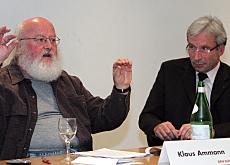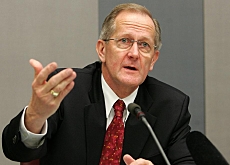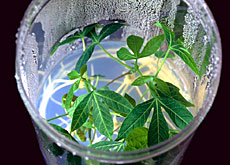Gene specialists come out against moratorium

A group of Swiss scientists has warned that if voters accept a moratorium on the use of genetically modified organisms (GMOs) in agriculture, research could suffer.
The Gen Suisse Foundation said that delaying the use of GM plants would also undermine teaching in Switzerland’s universities.
Swiss voters are being asked on November 27 whether to accept a five-year moratorium on GMOs.
“Switzerland cannot afford to stick its head in the sand,” said Ernst Hafen, who will take over as the president of Zurich’s Federal Institute of Technology in December.
“Ten of Europe’s best 50 biotechnology researchers are Swiss,” he added. “We should not hinder their projects or they will start heading abroad.”
Hafen also believes that careers could be nipped in the bud. “Uncertainty or a poisonous working environment will make some people hesitate to pursue a career in this field.”
The genetics specialist pointed out that even safe tests of GM plants in a controlled environment are difficult to carry out because of protests from associations opposed to the use of modified organisms.
For Hafen, current legislation restricting the use of GM plants is sufficient and there is no need for a further moratorium.
Fundamentalists
Klaus Ammann, head of Bern University’s botanical garden, warned that those backing the moratorium weren’t all lily-white either. “Some of them are fundamentalists who want to kill off genetic engineering and spread irrational fears,” he said.
Ammann added that the idea of biological farming in developing countries was a pipe dream.
“These nations already use modern technology for farming when they can afford it. But because they often can’t, it’s up to rich countries like Switzerland to make sure their research and development is as competitive as it can be,” he said.
Ammann said that examples of research that could benefit developing nations abounded, such as strengthening plant resistance to drought and salt or increasing the vitamins contained by plants.
Swiss farmers
But the ecologist also pointed out that Swiss farmers stood to gain from the use of GM plants.
“We have trouble eliminating mildew from potatoes, even with pesticides,” he said. “Modern genetic technology would give us a chance of dealing with it.”
On Monday, Economics Minister Joseph Deiss said that a moratorium on GMOs in agriculture would be bad news for farmers and consumers.
He added that the current law on the issue, which came into force last year, provided enough protection for people and the environment.
Deiss said that under the law the procedure for authorising GM crops lasts at least five years – as long as the moratorium. He also noted that a moratorium would give the wrong signal to the scientific community and would be harmful to economic sectors linked to research.
swissinfo with agencies
The Gen Suisse Foundation was created in 1991 to promote dialogue on gene technology between scientists and the public.
Its activities are financed by Interpharma, the pharmaceutical industry’s lobby group, whose members include Roche and Novartis.

In compliance with the JTI standards
More: SWI swissinfo.ch certified by the Journalism Trust Initiative



You can find an overview of ongoing debates with our journalists here. Please join us!
If you want to start a conversation about a topic raised in this article or want to report factual errors, email us at english@swissinfo.ch.